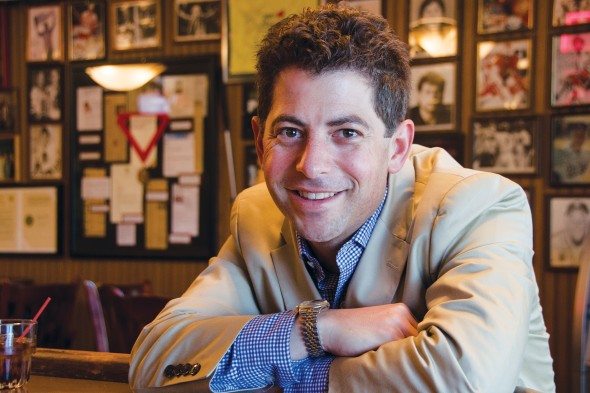Historian shares stories of the ’60s

Kevin Schultz’s latest book focuses on the friendship of political odd couple Norman Mailer and William F. Buckley Jr. “Mailer was a noted lefty, while Buckley was a man of the right,” says Schultz, associate professor of history. Photo: Joshua Clark/UIC Photo Services
In his upcoming book, Kevin Schultz uses the friendship of a political odd couple, Norman Mailer and William F. Buckley Jr., as a lens through which to view the tumultuous 1960s.
“Mailer was a noted lefty, while Buckley was a man of the right,” he said.
Yet they reviewed each other’s books before publication, appeared on TV shows together and otherwise nurtured “an extensive friendship that exceeded everything I had thought,” said Schultz, associate professor of history in the College of Liberal Arts and Sciences. Buckley and Mailer: The Difficult Friendship that Shaped the Sixties, is due next May.
Schultz took note of an “obvious intimacy” between the two men when he read excerpts from Mailer’s letters to Buckley published in The New Yorker. “I realized the letters would help me tell the stories of the 1960s,” he said. “I thought, ‘What a great story I’ve got!’”
Also in the book, making appearances that Schultz says are “more than cameos,” are James Baldwin, Gore Vidal, Truman Capote, Abbie Hoffman, Germaine Greer and Allen Ginsberg, all of whom corresponded with Mailer, Buckley or both.
“By 1970 there was a completely new set of cultural assumptions,” the author said. One difference was in what he calls The Rules.
“In the late 1960s, all The Rules become suspect, and people openly challenge them,” he said. “Men grow their hair long and stop, by and large, wearing collared shirts. Women don’t observe hemlines anymore, or traditional gender roles. Premarital sex becomes more socially acceptable and, in short, the persistent importance of obedience fades into a society where we are taught to ‘question authority,’ as the ever-present bumper sticker would have it.”
All that is grist for Schultz’s book. “The ’60s saw the violent birthing pains of a new order,” he said, “and Buckley and Mailer were like expectant fathers.”
Schultz also is the author of Tri-Faith America: How Postwar Catholics and Jews Held America to its Protestant Promise. “This came about because I was interested in the idea that America was once a Christian nation,” he said. “I wanted to figure out what led to the decline.”
One result of Christian dominance in the early 20th century was that Jews couldn’t get tenured positions at universities. Eventually, though, “a handful of people, mostly Protestants, took to heart the ‘Protestant promise,’ that everyone comes to God in his own way,” Schultz said. “In America, we should allow Catholics and Jews to have power.”
When it came to nativity scenes, people wondered whether they should either add a menorah to the display or ban religion from the public square. “Tolerance trios” — a priest, a minister and a rabbi — toured small towns in Iowa, Nebraska and southern Illinois in the ’30s and ’40s.
“’The Jews killed Christ, and took over financial institutions?’ The rabbi would say, ‘It’s a little more complicated than that,’” Schultz said. “Or, ‘Catholics want to take over politics,’ and the priest would say, ‘Of course not.’”
The trios were “exceedingly popular,” he said. “They were so well-known they were one of two nonmilitary groups allowed to go to military facilities around the world — the other was the Red Cross.”
At a football game at Fort Benning, Ga., in the mid-’40s, in what Schultz calls “the kitschiest example” of tolerance, the marching band formed a Star of David and played the Hebrew song “Ein Keloheinu,” then re-formed into a cross for a rendition of “Onward Christian Soldiers.”
Schultz’s third book is HIST, a history textbook, from the same series by publisher Cengage Learning that includes ECON, SOC and MKTG.
Schultz is a product of Los Angeles. His bachelor’s degree is from Vanderbilt and his master’s and Ph.D. from the University of California, Berkeley. Before earning the master’s, he spent two years in Park City, Utah, as a ski patroller. He also enjoys mountain biking and hiking.
Schultz joined UIC in 2007. In 2012-13, he received a Teaching Recognition Award from the Council for Excellence in Teaching and Learning and the Shirley A. Bill Award for Excellent Teaching from history faculty and students.
He lives in Oak Park with his wife, Terra, who does marketing for Sage Publishing. They have three children, “all named for people in American history that I admire,” Schultz said.
Thaddeus, 10, is the namesake of Thaddeus Stevens, a radical Republican who pushed for greater rights for newly freed slaves after the Civil War. Eleanor, 6, is named for Eleanor Roosevelt, and Quincy, her twin, for John Quincy Adams.
